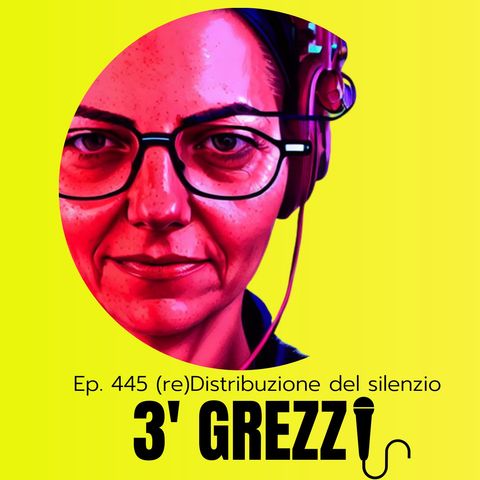3' grezzi Ep. 445 (re)Distribuzione del silenzio

Scarica e ascolta ovunque
Scarica i tuoi episodi preferiti e goditi l'ascolto, ovunque tu sia! Iscriviti o accedi ora per ascoltare offline.
3' grezzi Ep. 445 (re)Distribuzione del silenzio
Descrizione
A Milano nel 1977 John Cage con il suo concerto provocò un vero e proprio sollevamento di popolo, un tumulto, con tanto di pubblico sul palco che cercava di strappargli...
mostra di piùTRASCRIZIONE [ENG translation below]
Oggi voglio parlarvi di silenzio, ma non del silenzio a cui sono stata costretta per quasi un mese perché ho perso la voce, no. Voglio parlarvi del silenzio nella sua dimensione politica, perché sono capitata su un filmato che mi ha profondamente colpito.
È un filmato di John Cage, risale al 1977 ed è un suo concerto che ha tenuto al Teatro Lirico di Milano. Perché mi ha colpito? Perché dura diverse ore, anche se il video dura un paio di minuti, però il concerto durò moltissime ore e vide una folla inferocita scagliarsi contro John Cage, addirittura andarono sul palco, gli portarono via la luce e la lampada che gli illuminava il luogo di lavoro, gli portarono via il microfono ecc.
Perché suscitò così tanto scalpore questo suo concerto, che era anche una presa di posizione politica? Allora, il concerto, l'opera si chiamava Empty Words, parole vuote, cosa fece John Cage, che da sempre è un grande innovatore? Allora prese un brano e non fece altro che suddividere le parole dai silenzi e poi ridistribuire i silenzi in modo arbitrario. L'effetto era abbastanza strano, infatti all'inizio i primi minuti il pubblico era lì, era un pubblico di professionisti, intenditori, maestri d'orchestra, musicisti, studenti del conservatorio.
All'inizio l'effetto è un po' così, la gente non sa bene cosa pensare, si sente un fruscio in sala, però man mano che va avanti si rendono conto che questa cosa continua. Ed è un effetto molto straniante, perché non si capiscono le parole, non si capisce bene di che cosa si tratti, poi, ripeto, siamo nel 1977, quindi ancora molti metodi di sperimentazione si stavano, stavano appunto nascendo, l'orecchio non era, non era pronto, non era abituato a certi tipi di rappresentazione e alla fine veramente si sente come man mano dal pubblico prima fischi, poi buu, poi vattene. Alla fine, ripeto, si vedono le persone che letteralmente scendono dalle loro posizioni vanno sul palco quasi un assalto al povero John Cage, che però aveva già programmato tutto, sapeva che questo era quello che doveva succedere e sapeva che questo era quello che, il pubblico doveva reagire così. Tant'è che tra il pubblico - un sacco di gente con l'eskimo tra l'altro, e con la barba - si sente qualcuno che dice no, non reagite, perché se reagite lo state facendo vincere quello che lui vuole che noi reagiamo. È l'unica persona che aveva capito esattamente di cosa si trattava questa, quest'opera d'arte che voleva smuovere gli animi con la redistribuzione del silenzio.
TRANSLATION
Today I want to talk to you about silence, but not about the silence I was forced into for almost a month because I lost my voice, no. I want to talk to you about silence in its political dimension, because I happened upon a video that struck me deeply.
It's a clip about John Cage, it dates back to 1977 and it's a concert that he gave at the Teatro Lirico in Milan. Why did it hit me? Because it lasts several hours, even if the video lasts a couple of minutes, but the concert lasted many hours and saw an angry crowd throwing themselves against John Cage, they even went on stage, took away the light and the lamp that lit up his working space, they took away his microphone etc.
Why did this concert, which was also a political statement, cause such a stir? So, the concert, the work was called Empty Words, what did John Cage do, he who has always been a great innovator? Well, he took a work and did nothing but divide the words from the silences and then redistribute the silences arbitrarily.
The effect was quite strange, in fact at the beginning the first few minutes the audience assisting, it was an audience of professionals, connoisseurs, orchestra masters, musicians, conservatory students, at first the effect is a bit like this, people don't quite know what to think, you hear a rustling in the room, but as it goes on they realize that this thing continues. And it is a very alienating effect, because you don't understand the words, you don't quite understand what it is about, then, I repeat, we are in 1977, so many methods of experimentation were still being developed, they were just being born, the ear was not, wasn't ready, they weren't used to certain types of representation and in the end you really feel like little by little the audience boos, then boo, then go away. In the end, I repeat, you see the people who literally get off their positions go on stage almost an assault on poor John Cage, but he had already planned everything, he knew this was what had to happen and he knew this was what, the public had to react like this. So much so that in the audience - a lot of people with '60s style parkas among other things, and with beards - you can hear someone saying no, don't react, because if you react he wins, he wants us to react. He is the only person who understood exactly what this was all about, this work of art that wanted to move souls with the redistribution of silence.
LINKS
Un articolo che racconta l'avventura di John Cage a Milano https://soundart.zone/john-cage-in-italia-empty-words-al-teatro-lirico-milano-1977/
Un estratto dal concerto https://www.youtube.com/watch?v=KGerrvq-UlI
Informazioni
| Autore | M. Cristina Marras |
| Organizzazione | M. Cristina Marras |
| Sito | - |
| Tag |
Copyright 2024 - Spreaker Inc. an iHeartMedia Company

Commenti